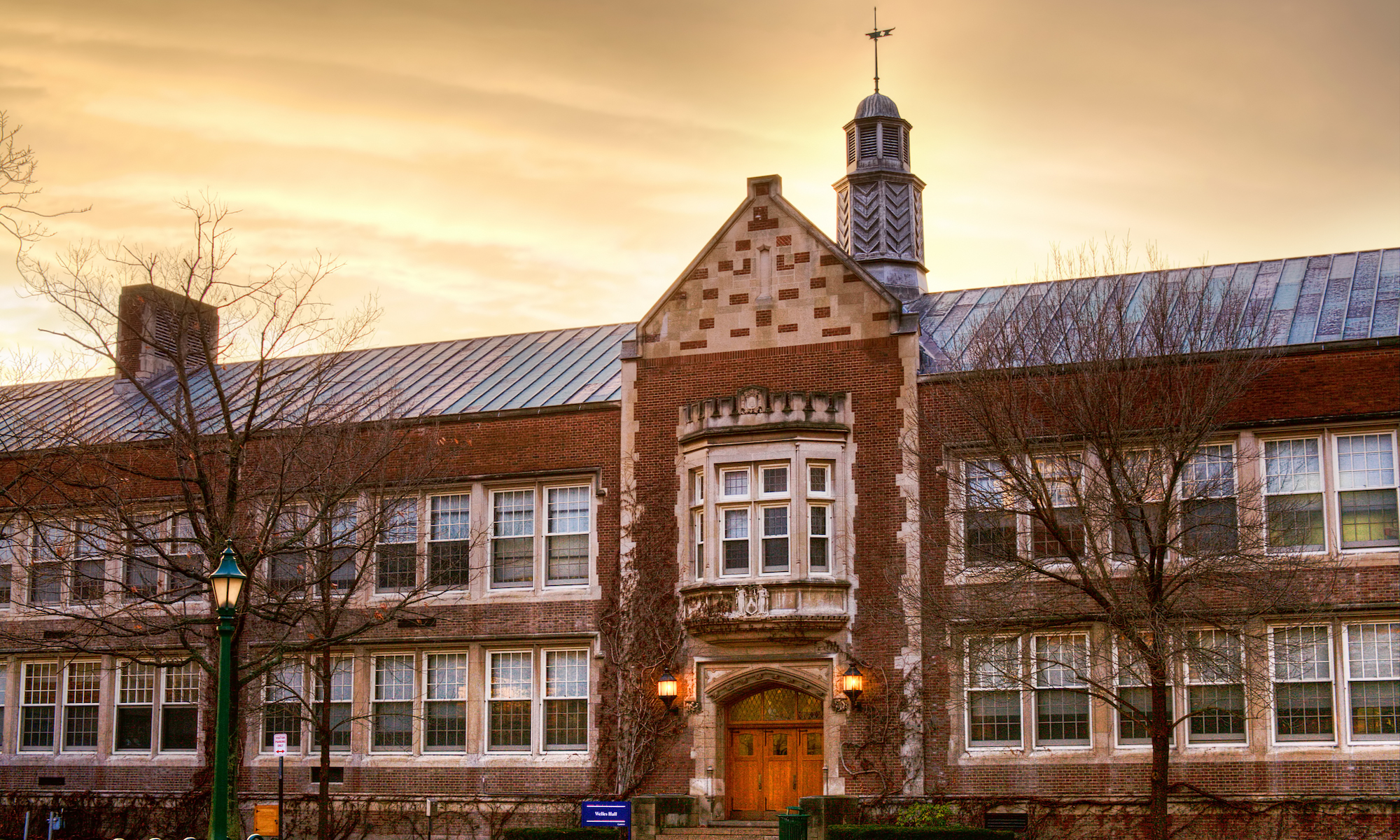Bellevue Literary Review held a symposium called “Can Storytelling Prevent Gun Violence?” Professor Rachel Hall, alum Monica Wendel and Gandy Dancer contributor Edward Supranowicz have work online in conjunction with the symposium.
Roos and Burgio earn national recognition from Sigma Tau Delta
Elizabeth Roos and Carly Burgio received national recognition for their work at April’s annual convention of the English honor society, Sigma Tau Delta. Both junior English majors were selected for their awards from more than four hundred presenters at the Atlanta, Georgia event, where SUNY Geneseo was represented by six competitively selected students.
Carly, who studies English literature and adolescent education, received an honorable mention for the Beth DeMeo Poetry Award, presented for excellence in convention presentations for critical work on poetry or a poet. Carly’s paper, “Redefining the Image of Emily Dickinson,” examines the correspondence between Dickinson and her long-time friend and sister-in-law Susan Huntington Gilbert Dickinson, exploring how these letters support a new framework of queerness through which to study the Dickinsonian canon. Through a queer theory lens, Carly’s paper delves into the complexities of Dickinson’s personal life, the impact of editors on the literary canon, and the theme of expanding the canon to become a more inclusive space.
Elizabeth is on the creative writing track of the English major, with minors in film studies and medieval studies. She took second place in the Isabel Sparks President’s Award for Original Prose with her literary fiction “Hen Feathers.” The short story follows Leah, a young woman who lives with her husband Mitch and her three chickens: Charlotte, Gertrude, and Bernadette. When Leah finds Bernadette dead one morning, killed by a fox, she is forced to readdress how far she and Mitch have come since beginning their relationship in college, and whether her dreams for their relationship have remained the same over time. Elizabeth structures a smaller, tangible conflict to suggest a much larger, intangible conflict—in this case, the death of a beloved chicken reveals tension within a relationship.
The English department congratulates Carly and Liz on these national awards and we celebrate the hard work and thoughtfulness that went into both pieces!
All members of Sigma Tau Delta at Geneseo are invited to submit to the annual convention; next year’s will be held in Denver, Colorado.
English department inducts 2022 Sigma Tau Delta students in person
On April 14th, thirty-nine students were inducted into Sigma Tau Delta’s Iota Lambda chapter of the English Honor Society at Geneseo. It was the first in-person induction hosted in three years, since the start of the pandemic, and there was an additional Zoom livestream for those who could not attend, or to enable family and friends to watch.
Current President Georgia VanDerwater welcomed the inductees before incoming President Hannah Lustyik introduced the ceremony’s keynote speaker, English and Black Studies professor, poet, and translator Dr. Lytton Smith. Taking a little time off from organizing GREAT Day, Dr. Smith gave heartwarming comments linking acclaimed YA series Wings of Fire to forming a community through shared experiences that unite us across differences. Students and faculty alike have faced adversities throughout and beyond the COVID-19 pandemic: through hardships we often find ourselves drifting apart from one another, but Dr. Smith’s speech reminded us how we can come together as a community—of students, scholars, and educators—to support and uplift one another. His message resonates particularly with Sigma Tau Delta’s mission of creating a friendly and inclusive literary community on campus.
In the annual business section of the meeting, the e-board members described their positions and their collective efforts this past year. Georgia spoke of Sigma Tau Delta’s continued efforts towards diversity and outreach, including this year’s lecture series on the topic of “Exploring Black Voices in Contemporary Media”; Public Relations Chair Rebecca Perry followed up by announcing the final lecture in the series, which will be delivered by Dr. Beth McCoy on April 20th in the Harding Lounge under the title “Yes, and Joy: Black Improv.” Rebecca also mentioned the many panels at GREAT Day that will feature English students and faculty, and reiterated the honor society’s commitment to being a hub for advertising all English-related activities. Grace Lawrence talked about her work as Treasurer, which included collecting dues and donations, marketing and organizing the English department’s new merch, and selling honors cords. The Academic Co-Chairs Isaac Schiller and Elizabeth Roos wished the new inductees well and promoted the recent annual Sigma Tau Delta Convention, which was held in person for the first time since 2019 in Atlanta, Georgia, and will take place in Denver, Colorado in 2023. Matthew Keller, who was inducted in this year’s ceremony, discussed his recent experience as the Community Service Chair and the ease of joining the e-board at the same time as joining the society; along with his efforts to facilitate an English community via Discord, he also endorsed our involvement with The Arc’s membership drive, which supports people with intellectual and developmental disabilities. Finally, Hannah extolled the friendship and fellowship forged by the e-board, encouraging new inductees to apply for the positions, as everyone is welcome to participate in society affairs and events.
To officially induct our new members, Dr. Gillian Paku, Sigma Tau Delta’s advisor, explained the history and goals of the organization in the context of SUNY Geneseo, noting that 2022 is Iota Lambda chapter’s 50th birthday and that Geneseo has a particularly strong and active community. She praised this year’s e-board and members for “building back better” after so many projects were stalled by the pandemic, and ended the ceremony with a call-and-response of Sigma Tau Delta’s pledge. Certificates, refreshments, and congratulations went out to the new members listed below: we welcome them and look forward to working together.
- Sarah Bryk
- Jesper Chitsaz
- Francheska Colon
- Danielle Crowley
- Bridget Cunningham
- Hannah D’Accurzio
- Margaret Doty
- Marlee Fancett
- Nina Fichera
- Julia Grunes
- Travis Johnson
- Hayley Kahnis
- Jillian Kavanaugh
- Matthew Keller
- Ashley Kupiec
- Griffen LaBianca
- Kathleen McCarey
- Emily McIntosh
- Samantha Miller
- Joseph Morgan
- Diana Morley
- Jenna Murray
- Amanda Neri
- Laryssa Olsen
- Ella Pearcy
- Elliot Pecora
- Sarah Pleines
- Kya Primm
- Natalie Putnam
- Susan Romance
- Kerstyn Sage
- Sarah Sharples
- Casey Sherman
- McKinley Skala
- Jordie Slobodow
- Hannah Smith
- Bryanna Spaulding
- Madelyn Tavernier
- Ben Timmons
- Cassandra Walters
- Mandy Xiang
Sigma Tau Delta students present their work in Atlanta
On Wednesday, March 30, six Geneseo English majors departed for the 2022 International Sigma Tau Delta Convention held in Atlanta, Georgia. This convention, unlike last year’s, was held in person, allowing for a variety of roundtable and panel events. Carly Burgio, Matthew Keller, Hannah Lustyik, Elizabeth Roos, Isaac Schiller, and Georgia VanDerwater all presented works both creative and analytical throughout the three days of the convention.
On the first day, Isaac presented his paper on “Dante’s Domestic Responsibility as a Holy Mission,” and Hannah read her poetry collection “Burn & Breathe & Bleed.” On the second day, Georgia presented her thoughtful piece titled “African Diaspora: Generations of Loss and Love,” Carly presented her “Redefining the Image of Emily Dickinson,” and Matthew presented his argument on “Assimilation Through the Eyes of Gulliver.” On the third and final day, Elizabeth read from her prose piece titled “Hen Feathers.” Many of the attending students acted as chairs for the other panels, introducing the presenters and facilitating the Q&A portion, while chapter advisor Dr. Gillian Paku served not only as the esteemed trip leader but also as the moderator on many panels.
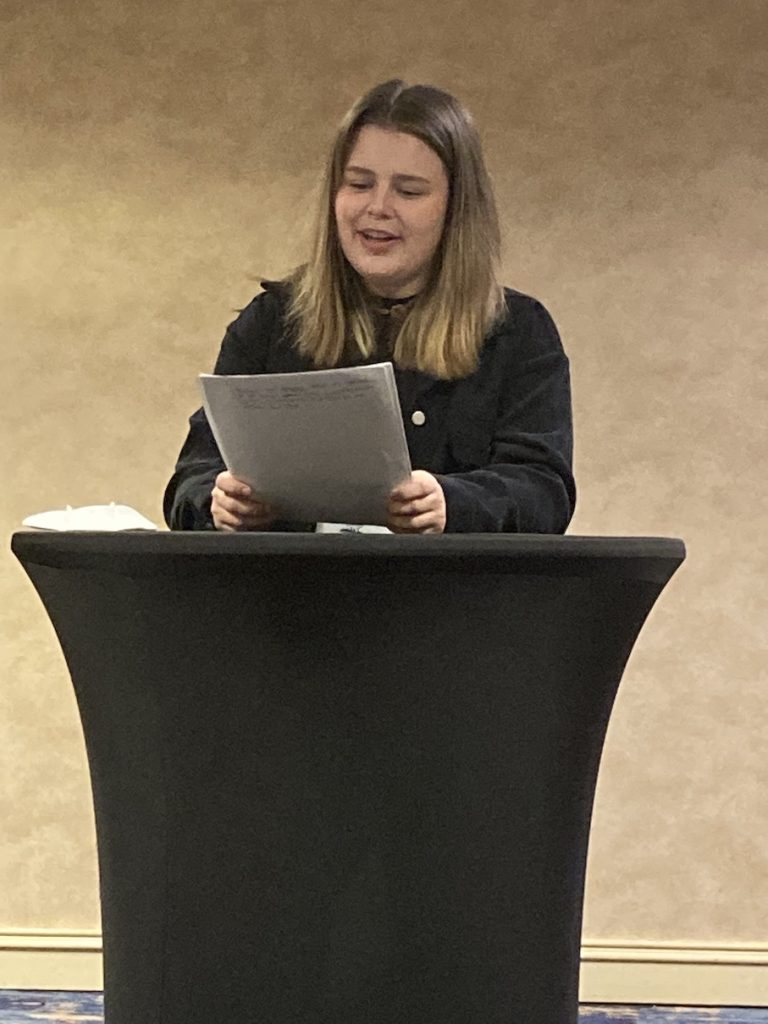
The students had the pleasure of hearing keynote speakers Richard Blanco, inaugural poet for former President Barack Obama, and Nic Stone, author of Dear Martin, a novel set in Atlanta that features a protagonist trying to make sense of contemporary racial injustice by corresponding with Martin Luther King, Jr. The students then visited the nearby Martin Luther King, Jr. National Historical Park. It was not only a wonderful time for the attending students to spend getting to know each other and listening to peers from all over the country, but also to enjoy some of Atlanta’s attractions, food, and weather 40° warmer than in Geneseo!
This opportunity is available annually to all members of Sigma Tau Delta, and acceptance is competitive. The cost of travel, accommodation, and attendance is typically offset by the English Department and an undergraduate travel and research grant from the college. Next year’s convention location is Denver, Colorado; look for advertising and deadlines in September and October, 2022.
Geneseo’s Sigma Tau Delta chapter is active all year; new members are inducted each spring (on April 14 in 2022), and most activities are open to all members and friends of Geneseo English. For further information about Sigma Tau Delta at Geneseo, please contact the incoming student president, Hannah Lustyik, or the faculty sponsor, Dr. Gillian Paku.

Photos: Gillian Paku
Geneseo English department’s statement on racial justice
The English department has added a statement of commitment to action on racial justice to its website. You can also read the statement below.
Our Commitment to Action on Racial Justice
As protests continue and emerge across the U.S. and around the globe in response to the killing of George Floyd, and the killings of Ahmaud Arbery and Breonna Taylor, we write to express our anger and grief. We write to acknowledge that the protests unfold not only because of these killings but because of the accumulated history of Black death at the hands of law enforcement, vigilantes, and the violence of structural inequalities. We acknowledge and mourn too many deaths, from Eric Garner to Jonathan Ferrell and Nina Pop, from Aiyana Stanley-Jones and Pamela Turner to Patrick Dorismond, from Tamir Rice and Tanisha Anderson to Amadou Diallo, from Sandra Bland and Korryn Gaines to Atatiana Jefferson and Shantel Davis and Trayvon Martin and so many more human beings across time and geography. We acknowledge that these protests unfold also because of the toll of COVID-19 that has fallen disproportionately upon Black people because of the long-term effects both of white supremacy and anti-Black racism. We write to support Black Lives Matter and other national and local movements for justice and to commit to actions as well as words.
We write to support Black students who in both the physical and digital world must navigate Geneseo. We witness the excellent academic and creative work of the Black students in our classes, students able to thrive and innovate even while Geneseo’s spaces, like those of other predominantly white campuses, accumulate everyday careless and gratuitous insults and other obstacles to Black students’ achievement of a public liberal arts education.
As Geneseo English alumna Evelyn Mendez puts it, “Black individuals are dying inside and outside of jails and because many of us are afraid to seek help because of systemic racism….We aren’t at peace. All we want is to no longer live in fear.” We write, then, in response to her and her peers: we write to affirm the shared responsibility of our Community Commitment to Diversity, Equity, and Inclusion, and particularly to “sustaining and expanding the diversity of our community and to making equity for all members of our diverse community a measure of our success.” That is, we write to acknowledge we can and must do more and better to fight actively against anti-Black racism.
As faculty members who study and craft literature, we rely on the long record of evidence that Black artists, scholars, and cultural critics have woven into stories of the fight against fear and the fight for peace that cannot be unpartnered from justice. These are narratives that, in the words of Geneseo English alumna Dr. Jacqueline Monique Jones, can “help us better understand the world that we’re in and the world that we want to see.” We strive in our courses to offer specific historical and cultural contexts for the texts that we teach, understanding both that art does not lie outside of history and politics and that complex stories and rigorous interdisciplinary scholarship inform the transformative Black art and activism we witness today. Such transformation is possible even and especially when it feels impossible; indeed, as Geneseo English alumna Sabrina Bramwell put it during her 2019 Senior Oration, “A core characteristic of interdisciplinary thinking is being willing to value a thought that differs from your own and use it to foster growth. With this mindset, the fear of difference is transformed to intrigue, the unfamiliar is now admired, and inclusion—the desire to hear different opinions—develops more naturally.” Discomfort is not there to be avoided but rather to be explored, not singly or by a few but by a community committed to equity as essential to inquiry.
As teachers and scholars, our commitment is to be listeners: to learn, to reflect, to educate ourselves and others. In the wake of the 2016 election, Mariame Kaba wrote that “Humility is in order across the land. It’s really OK to say that you don’t know the answers. You don’t have to pretend you do.” Kaba’s words guide us now. We commit to taking action, and in doing so commit to making Black lives the center while not asking those most affected by anti-Black racism to take on more emotional labor. We commit to be accountable for the sources, words, images, and narratives that we spread in personal and digital spaces, especially as Black Lives Matter warns of misinformation and disinformation targeted at the movement. We commit to take action within our various spheres of influence. We refuse saviorism, white and otherwise. We offer what we have and can in service to building a more just world.
Above all, we are called to commit to behaviors and structures for care and caring rather than behaviors and structures that exist only for calling to order, as Fred Moten has termed it. Such commitment must be careful. As Saidiya Hartman has affirmed, “Care is the antidote to violence.” Yet also as Geneseo English alumna Davina Ward has affirmed, “Care can exist as violence. Violence can exist as care.” We see this over and over where police, whose charge is to “care and protect,” target Black people with violence. Resources devoted to continuing such violence (such as the $230 million paid out in claims against the NYPD in 2018 alone) must be reallocated to structures for public health, mental health, and public education.
As faculty members who teach and craft works of the imagination, we must not fail to work to build the different world that protestors and students are imagining through their demands. Indeed, rather than just saying Black lives matter, we should actively work on what Geneseo English and Philosophy student Emma Mandella identifies as a new model for reparations. Citing the work of Roy Brooks, in “The Ills of American Capitalism: A New Case for Reparations,” Mandella argues for reparations in the atonement model, demanding revolutionary structural change to support Black citizens. As an alternative to settlement reparations, the atonement model emphasizes long-term efforts to address structural inequalities and systemic inequities.
We close with words from Dr. Bernice Johnson Reagon, who notes a truth that emerged from her experience coming into what she calls her “full power” as an adult human being during the Civil Rights Movement:
Sometimes you really need things to be thrown up in your community, everything to be turned over in such a way so you have another chance to look at what you have put together. And in any culture, any people, any history, throwing things up gives you a chance to be selective about what you will carry forward.
Note: All Geneseo students and alumni invoked in this statement have given their express consent to their work being included in this context.
Lytton Smith to direct new Center for Integrative Learning at SUNY Geneseo
The Office of the Provost at SUNY Geneseo has named Dr. Lytton Smith director of the college’s new Center for Integrative Learning, effective August 2. The center represents a strategic re-imagining of the current Center for Inquiry, Discovery and Development, which supports SUNY Geneseo’s mission to promote transformational learning experiences and to inspire students to be socially responsible and globally aware citizens.
In an email to campus faculty and staff, Provost Stacey Robertson writes that the new center will “play an expanded role in developing and promoting academic experiences that are interdisciplinary, connect learning opportunities to real world problems and issues, and encourage students to explore and articulate connections across their different experiences.”
Robertson points out that since coming to SUNY Geneseo in fall 2014, Smith, who was recently awarded tenure and promoted to the rank of associate professor, “has helped create or sustain a number of collaborative high impact educational opportunities for Geneseo students, including interdisciplinary and team-taught experiences that cross disciplines and divisions, study abroad, and community-based learning, often working with collaborators across science and humanities fields.” Smith’s work, she continues, “including his literary translations of Icelandic literature, in many ways models the principles of integrative learning. Under his leadership the CIL is poised to make considerable progress in advancing our goals as a public liberal arts institution that empowers students to make meaningful connections across their academic experiences.”
Author and activist Bill McKibben to deliver 2017 Walter Harding lecture September 30
Author and environmental activist Bill McKibben will deliver The 2017 Walter Harding Lecture on Saturday, September 30 at 4 p.m. in Wadsworth Auditorium on the SUNY Geneseo campus.
[Download the 11 x 17 poster here.]
McKibben is the founder of 350.org, an environmental advocacy group that uses grassroots organizing and mass mobilization to oppose new coal, oil, and gas projects; limit climate-warming emissions; support sustainable energy solutions at the community level; and educate governmental leaders and the general public.
McKibben is the author of more than a dozen books, including The End of Nature, widely regarded as the first book about climate change written for a general audience, and Oil and Honey: The Education of an Unlikely Activist. He writes frequently for such publications as The New Yorker, The New York Review of Books, National Geographic, and Rolling Stone.
The Schumann Distinguished Scholar in Environmental Studies at Middlebury College in Vermont, McKibben is also a fellow of the American Academy of Arts and Sciences. In 2013, he was awarded the Gandhi Peace Award and honored by the Thomas Merton Center with its yearly prize recognizing “activists who work on national and international issues that transform our world.”
McKibben’s annotated edition of Henry David Thoreau’s Walden gratefully acknowledges its “comprehensive and illuminating” predecessor, Walden: An Annotated Edition (1995), edited by Geneseo’s late SUNY Distinguished Professor of English Walter Harding. Harding’s annotations are available in an online edition of Walden from Digital Thoreau.
You can learn more about Bill McKibben on his personal website.
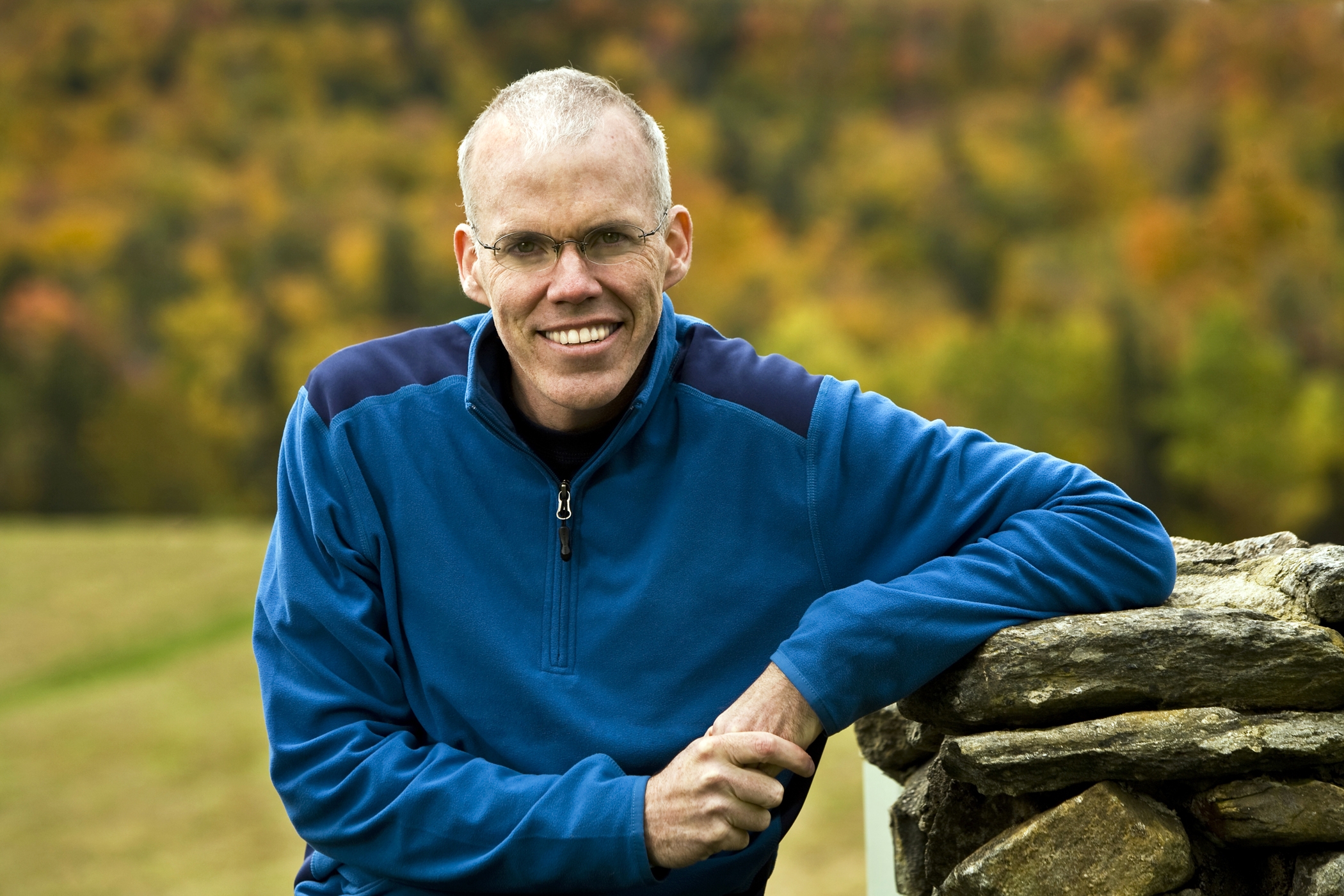
Students at Duke Kunshan University Analyze Thoreau Across Cultures
[Editor’s Note: A version of this post appeared earlier on the blog of Digital Thoreau.]
This spring, about two dozen students in two sections at Duke Kunshan University in Kunshan, China are taking “Walden International: Analyzing Thoreau Across Cultures” from Patrick Morgan, a Ph.D. candidate and Graduate Instructor in English at Duke University and a graduate of SUNY Geneseo (English, Geological Sciences, 2010). Morgan wrote about his experience as an English major at Geneseo for this blog back in December, 2013.
Morgan’s Kunshan students are discussing Walden in the margins of Thoreau’s work at The Readers’ Thoreau, the online community of Digital Thoreau, a collaboration among SUNY Geneseo, The Thoreau Society, and the Walden Woods Project directed by SUNY Geneseo Professor of English Paul Schacht.

The students are also “analyzing [Thoreau’s] writings from an international perspective, focusing primarily on his engagement with Asian thought,” according to Morgan’s syllabus, asking how Thoreau “‘package[s]’ ancient Asian philosophies in order to comment on nineteenth-century American culture” and what “cultural forces and contexts … allow scholars like Lin Yutang to claim Thoreau as ‘the most Chinese of all American authors.’”
In addition to meeting with Morgan for 300 minutes each week in class and exchanging ideas online in the margins of Walden, the Kunshan University students are taking a digital field trip to Walden Pond thanks to a website Morgan has created that links passages of Thoreau’s text to YouTube videos he made in which he reads aloud from Walden while capturing the pond’s sights and sounds.
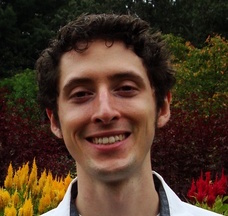
Morgan has been active in Thoreau studies since his undergraduate days at Geneseo, where he presented on “Thoreau’s Bedrock: Emerson’s Influence and the Geomorphological Significance of Emerson’s Cliff, Concord, Massachusetts” for Geneseo’s day celebrating undergraduate research, GREAT Day, in 2010. That same year, his article on “Aesthetic Inflections: Thoreau, Gender, and Geology” appeared in the Thoreau Society’s scholarly annual, The Concord Saunterer. In 2015, Morgan participated in an NEH summer institute for college instructors on “Transcendentalism and Reform in the Age of Emerson, Thoreau, and Fuller” conducted in Concord by a roster of scholars that included Sandra Harbert Petrulionis, Phyllis Cole, Jayne Gordon, Robert Gross, John Matteson, Wesley T. Mott, and former Geneseo Harding lecturers Laura Dassow Walls, Megan Marshall, and Joel Myerson.
In addition to his studies and teaching at Duke University, Morgan serves as an editorial assistant at the scholarly journal American Literature, published by Duke University Press.
Geneseo students shine at 2016 Sigma Tau Delta Conference
Seven Geneseo students represented the English department last week at this year’s convention of Sigma Tau Delta, the international English honor society. The students — Noah Chauvin, Ariana Dipreta, Jeremy Jackson, Elizabeth Landrum, Megan Meadows, Zachary Muhlbauer, and Michelle Mundt — were accompanied by Prof. Gillian Paku, faculty advisor to Geneseo’s chapter of the society.
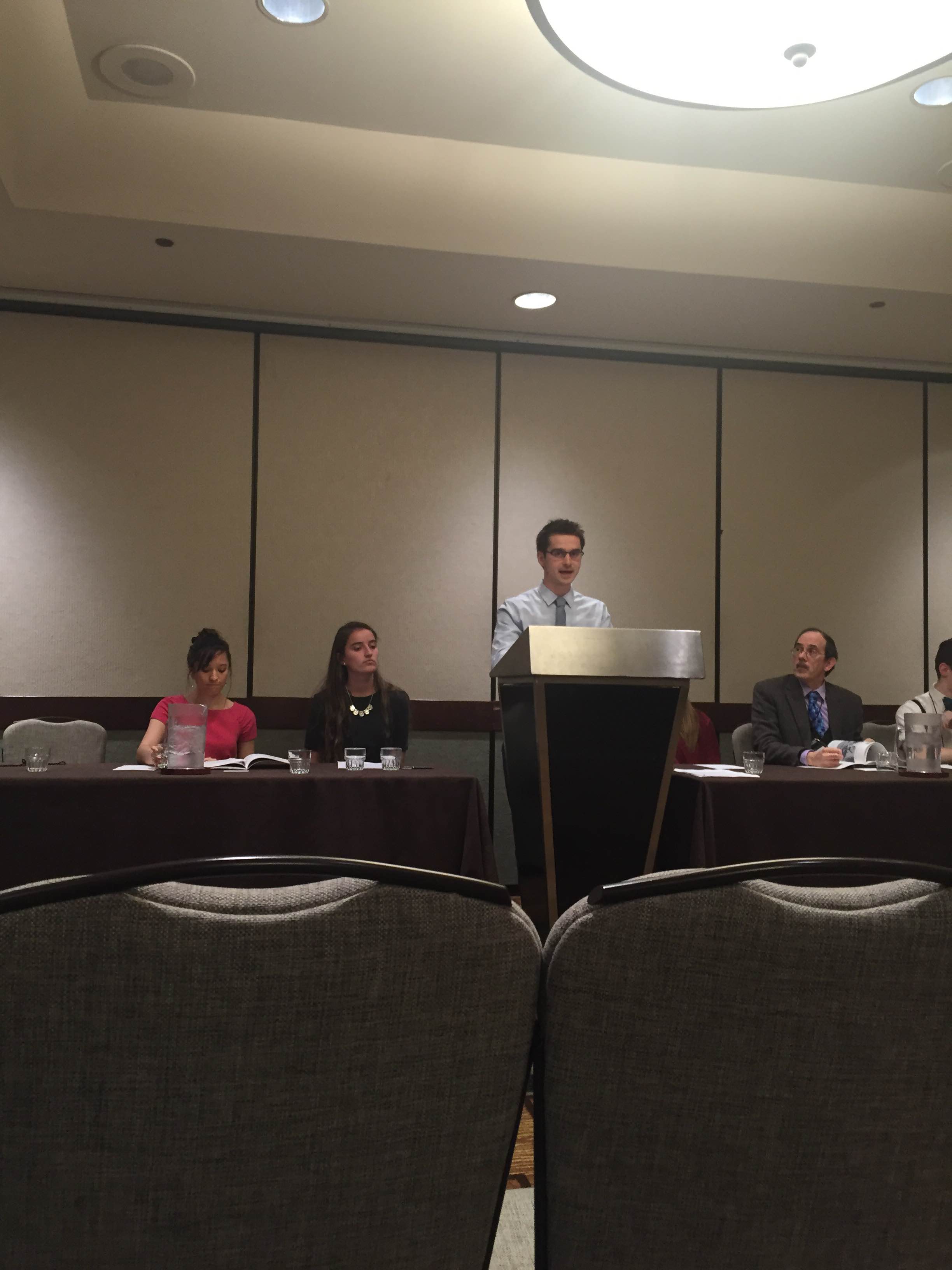 Over the course of three days, the students presented their peer-reviewed work in front of engaged and enthusiastic audiences. Each student participated in a panel with papers on related topics (James Joyce, Oscar Wilde, issues of race or postcolonialism), offering opportunities for members of the audience to pose questions and for presenters to establish running dialogues among themselves. Showing great support for one another, the students attended the panels of their Geneseo peers, along with many other panels of interest, be it one focused on C.S. Lewis and J.R.R. Tolkien, on African American literature, or featuring creative nonfiction on addiction and depression.
Over the course of three days, the students presented their peer-reviewed work in front of engaged and enthusiastic audiences. Each student participated in a panel with papers on related topics (James Joyce, Oscar Wilde, issues of race or postcolonialism), offering opportunities for members of the audience to pose questions and for presenters to establish running dialogues among themselves. Showing great support for one another, the students attended the panels of their Geneseo peers, along with many other panels of interest, be it one focused on C.S. Lewis and J.R.R. Tolkien, on African American literature, or featuring creative nonfiction on addiction and depression.
[See more photos from the convention.]
There were numerous ways to network and meet like-minded peers, domestic and international, as well as chances to explore the cultural backdrop of Minneapolis, from performances at the renowned Guthrie Theatre to wandering the huge Mall of America, plus the occasional gathering at an Irish pub. As has been the case for several years now, the Geneseo group also took home one of the convention prizes for best submissions, with Noah’s creative non-fiction essay, “For Want of Syncope,” winning second place as a response to the convention’s common reader, Charles Baxter’s The Soul Thief (2008).
All students who are members of Sigma Tau Delta are eligible to submit to the convention, a competitive process. Next year’s convention will be held March 29 – April 1 in Louisville, KY, where one of the featured speakers will be Marlon James, recent winner of the Man Booker Prize.
Submissions are usually due at the end of October, and the Sigma Tau Delta student e-board is always happy to help with the process and keep our excellent tradition of participation strong.
English major Meghan Barrett wins Phi Beta Kappa writing internship
This news is so fresh that the press release below isn’t yet live on the Phi Beta Kappa website (though by the time you click that link, maybe they’ll have posted it).
English major (creative writing) Meghan Barrett has won a prestigious Phi Beta Kappa writing internship. Here’s the release:
MEGHAN BARRETT SELECTED FOR PHI BETA KAPPA WRITING INTERNSHIP
WASHINGTON, DC – The Phi Beta Kappa Society is pleased to announce that Meghan Barrett of the State University of New York at Geneseo has been selected for a 2016 Phi Beta Kappa Writing Internship.
The Phi Beta Kappa chapter at SUNY Geneseo recommended Meghan to work with the Society’s national office in Washington, DC. The internship begins this month and continues through May 2016.
A native of Penfield, New York, and a graduate of Our Lady of Mercy High School, Meghan is a senior with a double major in Biology and Creative Writing. She is also part of the college’s Edgar Fellows Honors Program and was inducted into the Alpha Delta of New York chapter of Phi Beta Kappa in 2015.
Meghan is also serving as a website management intern for the Geneseo Office of Sustainability and is a writer of book four of Liber Primus Games’s Narborion Saga. She is the President of Alpha Delta Epsilon regional sorority and was named Geneseo’s 2015 Outstanding Sorority Woman. Meghan plans to earn a PhD in Biology after completing her bachelor’s this spring—while continuing to write poetry, plays, and novels in her spare time.
Phi Beta Kappa’s writing internships are for juniors and seniors majoring in the liberal arts or sciences who attend institutions where our chapters are located. Interns must make a five-month commitment to the program and prepare a minimum of six publishable articles for the Society’s publication for news and alumni relations, The Key Reporter.
The program has two deadlines annually, for internships in the fall or spring of each academic year.
No more than 15 students are selected from a national pool in each round.
